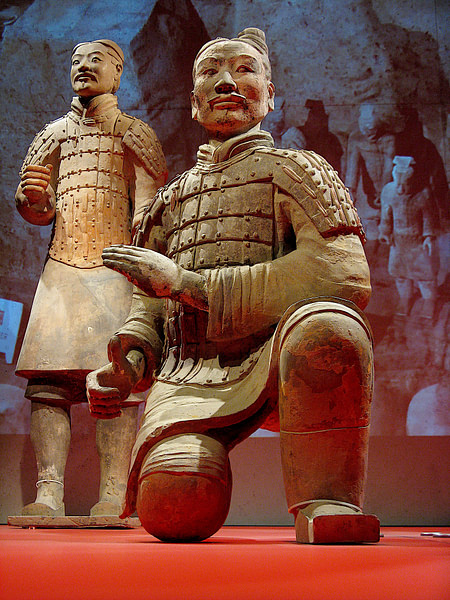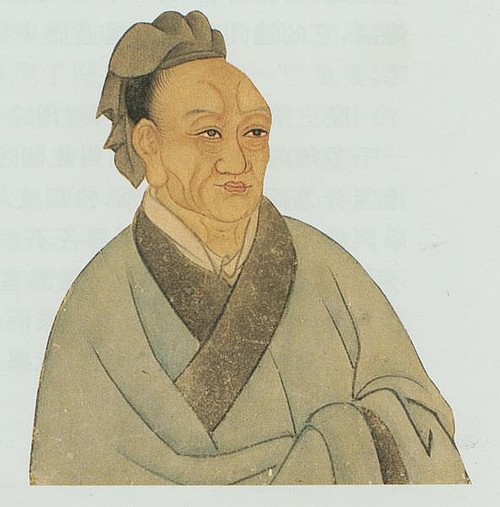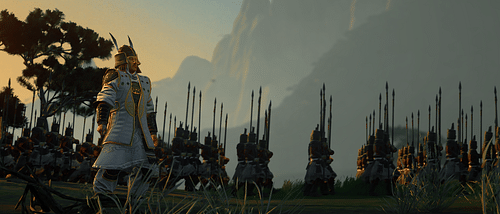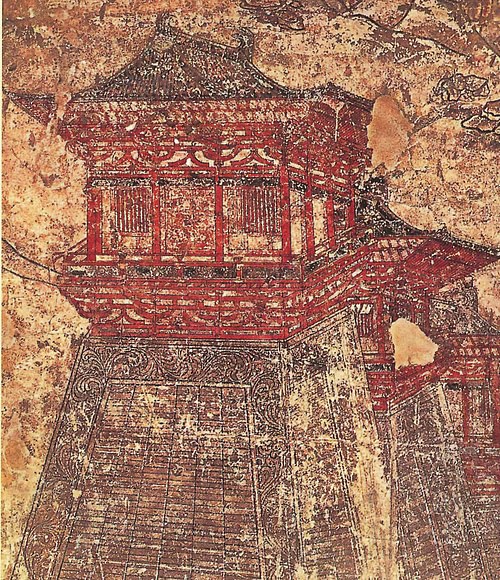97 Which Legendary Chinese Military Thinker Wrote the Art of War?
Lord's day Tzu (50. c. 500 BCE) was a Chinese military strategist and full general best known as the writer of the work The Art of War, a treatise on military strategy (likewise known equally The Thirteen Chapters). He was associated (formally or as an inspiration) with The School of the Armed forces, one of the philosophical systems of the Hundred Schools of Thought of the Bound and Autumn Period (c. 772-476 BCE), which advocated military preparedness in maintaining peace and social order.
Whether an individual by the proper name of Sun-Tzu existed at all has been disputed in the same style scholars and historians debate the existence of his supposed contemporary Lao-Tzu (fifty. c. 500 BCE), the Taoist philosopher. The beingness of The Art of War, all the same, and its profound influence since publication clearly proves that someone existed to produce said piece of work, and tradition holds that the work was written past 1 Sun-Tzu.
His historicity would seem to have been confirmed by the discovery in 1972 CE of his work, too every bit that of his apparent descendant, Dominicus Bin (d. 316 BCE) who wrote another Fine art of War, in a tomb in Linyi (Shandong province). Scholars who challenge his historicity, however, however merits that this proves nothing equally the earlier Art of State of war could still have been composed by someone other than Sun-Tzu.
Sun-Tzu is said to take lived, fought, and composed his work during the Jump and Autumn Period which preceded the Warring States Menstruation (c. 481-221 BCE) during which the Zhou Dynasty (1046-256 BCE) was failing and united states once bound to information technology fought each other for supremacy and control of China.
Lord's day-Tzu'due south piece of work has been consulted past military figures & business strategists ever since, & its lessons on how to achieve one's goals go along to exist valued.
In the early on part of the Spring and Fall Period, Chinese warfare followed traditional protocol in chivalric behavior before, during, and later an appointment. As the era wore on, yet, this adherence to tradition became increasingly frustrating in that no land could gain an reward over some other because each was post-obit exactly the same protocol and employing the same tactics.
Sun-Tzu's piece of work sought to break this stalemate by outlining a articulate strategy of winning decisively by whatever means were necessary. His concepts may accept been derived from earlier philosophies or may take been based on his own experience in battle. Either way, his theories were put into do past the king of the state of Qin, Ying Sheng (50. 259-210 BCE) who, by following Sunday-Tzu's philosophy, conquered the other states through a policy of full state of war and established the Qin Dynasty (221-206 BCE), declaring himself Shi Huangdi (r. 221-210 BCE), the first emperor of China. Sun-Tzu'due south work has been consulted by armed forces figures and business strategists since this fourth dimension and, in the present day, its lessons on how to attain ane's goals continue to exist valued by people of all social classes and occupations.
Historicity of Sun-Tzu
The difficulty in determining whether Sun-Tzu existed is due to the fourth dimension in which he is supposed to take lived and written his work. The Spring and Autumn Period and after Warring States Flow were a cluttered era divers by the pass up of the authority of the Zhou Dynasty and the incessant disharmonize between united states of america which in one case supported and defended it.
The turmoil of this era, and the subsequently devastation of diverse works by the Qin Dynasty, resulted in the loss of many significant records. It seems, however, that some full general at least approximating Sunday-Tzu'due south reputation must have lived and served during this fourth dimension and advocated a policy of full war in order to end the disharmonize of the warring states and constitute peace.

Chinese Terracotta Warrior
To Sun-Tzu, war was an extension of politics and should be pursued in the interests of the greater good for all, the conquistador and the conquered. In order for warfare to be defined as anything other than a waste of life and resources, however, one needed to win. The scholar Samuel B. Griffith writes:
War, an integral part of the power politics of the age, had become 'a matter of vital importance to the land, the province of life and expiry, the road to survival or ruin'. To be waged successfully, it required a coherent strategic and tactical theory and a practical doctrine governing intelligence, planning, command, operational, and administrative procedures. The writer of 'The Thirteen Chapters' was the first homo to provide such a theory and such a doctrine. (Griffith, 44)
Who that human being was, though, continues to be debated. Sun-Tzu's historicity is supported past two central works, The Spring and Autumn Annals (the state records of the Zhou Dynasty from 722-481 BCE) and the Records of the Thou Historian (c. 94 BCE) by the Han Dynasty historian Sima Qian (50. 145/135-86 BCE). Scholars take criticized both works for inaccuracies and possible conflations of events. The argument against Sun-Tzu'due south historicity claims that, had such a great military mind existed, more would have been written of him than just passing references. However, there are many entries in both works, accepted equally historically accurate, which are given the same cursory handling. The scholar Robert Eno comments:
The Spring and Autumn Register… is brief, not very informative, and inconsistent in its choice of events to note. A typical entry might read, 'Fall; eighth month; locusts.' (1)
Post-obit Eno's observation, critics of Sun-Tzu's historicity may have a valid point, but it must be conceded that the Register they claim should take fuller accounts of his life practice non accept total accounts of any significant figure or upshot. In the case of the Records, Sima Qian devotes more time to biographies of those whom he felt had been misjudged past history and therefore does not spend a great corporeality of time on Sun-Tzu who, presumably, would have been well-known to the audience of his day and whose reputation was secure.

Sima Qian
Bated from the brief mention, the Records of the Grand Historian has been criticized as unreliable in establishing Dominicus-Tzu's historicity by scholars challenge information technology is largely fanciful apropos the descriptions of the Xia and Shang dynasties. This claim might accept in one case been considered valid but archaeological excavations of the 20th century CE uncovered concrete evidence supporting Sima Qian'due south claims completely regarding the Shang and probably in regard to the Xia. The Records, in fact, is for the nearly part quite authentic, and this would include the department on Sun-Tzu.
The name he is known past, yet, is another obstacle in that information technology is not a personal proper noun; it is a championship translated equally The Master. Equally The Art of War repeatedly uses the phrase, "Lord's day-Tzu said…" in introducing the precepts, information technology has been argued that some great military genius, proper noun unknown, inspired the work which was written to record his strategies. It has also been suggested that some educatee of The School of the Armed forces could accept written the work to tape their central vision that victory in war ensured peace.
Historicity & Influence
Scholars who maintain the historicity of Sun-Tzu point to his role in the victory at the Battle of Boju (506 BCE) as proof. The sources on Sunday-Tzu claim that he served Male monarch Ho-Lu of Wu (likewise given as Helu, r. 515-496 BCE) in the Wu-Chu Wars of 512-506 BCE. Ho-Lu wanted to test Sunday-Tzu's skill and commitment before appointing him to lead and so commanded him to train his 180 concubines to be soldiers. Lord's day-Tzu divided the harem into 2 companies, each with the king's 2 favorites as their commanders. When he gave the first gild to face right, the women laughed, not taking the exercise seriously. Sun-Tzu repeated his command and, again, they giggled; he then had the two 'commanders' executed and replaced. After, the women obeyed his commands without hesitation and Ho-Lu hired Sunday-Tzu as his general.
This story has been considered fiction since at least the 11th century CE when the Sung Dynasty scholar Yeh Cheng-Tse start questioned Sun-Tzu'southward existence simply that has not stopped it from being repeated every bit fact up to the present day. Even if it never happened, it illustrates Sun-Tzu'southward delivery to winning, no matter the price, starting with the discipline of the troops.

Chinese Army on the March
According to Sima Qian, the story should be accepted every bit it is in keeping with Lord's day-Tzu's concept of subject field equally evidenced past the Wu victory at Boju. The Boju victory owed every bit much to the subject field of the troops as the strategy employed. Dominicus-Tzu is said to have led the Wu forces with King Ho-Lu, along with Ho-Lu's brother Fugai, and defeated the Chu forces through apply of his tactics. The Art of War describes the optimal strategy:
Though co-ordinate to my gauge, the soldiers of Chu exceed our ain in number, that shall advantage them zilch in the matter of victory. I say so that victory can be accomplished. Though the enemy be stronger in numbers, nosotros may prevent him from fighting. Scheme so as to discover his plans and the likelihood of their success. Rouse him and learn the principle of his action or inactivity. Force him to reveal himself, and then every bit to observe out his vulnerable spots. Advisedly compare the opposing army with your own, then that you may know where strength is superabundant and where it is deficient. In making tactical dispositions, the highest pitch you lot can attain is to conceal them; conceal your dispositions, and you will exist safety from the prying of the subtlest spies, from the machinations of the wisest brains. How victory may exist produced for them out of the enemy's ain tactics - that is what the multitude cannot comprehend. (6.21-26)
At Boju, the Chu forces were numerically superior to the Wu and Rex Ho-Lu hesitated to set on, though both armies were martialed on the field. Fugai requested that orders exist given to sound the charge, only Ho-Lu refused. Fugai then chose to human activity on his own in accordance with Dominicus-Tzu'south strategic advice and gave the social club to advance. If the troops had not been so well-disciplined, they may have hesitated, waiting on orders from the king. As information technology was, they obeyed their commander and Fugai drove the enemy from the field. He and so pursued them, defeating them repeatedly in five farther engagements, and capturing the Chu majuscule of Ying.
Fugai'south success in the Wu-Chu wars was due entirely to his own courage and his conventionalities in the precepts of Lord's day-Tzu. Through intelligence brought by spies, Fugai knew that the opposing general, Nang Wa, was despised past his troops and that they had no volition to fight. Post-obit Sun-Tzu's advice to "force him to reveal himself…find out his vulnerable spots", he compared his army with that of Nang Wa's and found information technology sufficient to his ends. He won victory from the enemy'south own tactics, every bit instructed by Sunday-Tzu, by refusing to attach to the standard rules of state of war as understood at that time. He did not let the enemy retreat to condom and did not allow them to cross the Qingfa River, merely instead cut the forces in half mid-stream, prevented their mobilization and germination of lines, and fifty-fifty later attacked them at their dinner.
Total War & Taoist Influence
Fugai'southward victory at Boju would have been impossible before Sun-Tzu. Equally noted above, warfare in China in the up through the early on years of the Spring and Autumn Period was considered a kind of sport of the noble gentry in which knightly prevailed and rules were not to be cleaved; Dominicus-Tzu changed all of that. Griffith comments:
In aboriginal China war had been regarded as a knightly competition. As such, it had been governed past a lawmaking to which both sides generally adhered. Many illustrations of this are found…For example, in 632 BC the Chin commander, after defeating Ch'u at Ch'eng P'u, gave the vanquished enemy three days' supply of food. This courtesy was later reciprocated by a Ch'u army victorious at Pi. By the time The Fine art of State of war was written this lawmaking had been long abandoned. (Griffith, 23)
Sun-Tzu changed the rules by applying Taoist principles to warfare and by refusing to consider war a sport. The Art of State of war states:
In war, then, let your great object be victory, not lengthy campaigns. Thus, information technology may be known that the leader of armies is the czar of the people's fate, the man on whom it depends whether the nation shall be in peace or in peril. (ii.19-20)
Sun-Tzu had no patience with the protracted games generals seemed to enjoy playing with each other. One time hostilities had erupted, ane's priority was to defeat the enemy, not indulge oneself in chivalry which could only prolong the conflict and cost more than lives. Scholar John M. Koller comments on how Taoism influenced the concepts of The Art of War:
Taoism finds [the] way for living well in doing what is natural, rather than in adhering to the conventions of guild. Consequently, instead of emphasizing the cultivation of virtue and the development of human relationships as Confucianism does, Taoism emphasizes the spontaneous ease of living attained by acting in accord with the natural way of things. (243)
This "spontaneous ease of living" is exemplified in Sun-Tzu's writings in that he consistently emphasizes the natural path to victory while ignoring the conventional wisdom of the time concerning military engagements. Koller further writes that the not bad Taoist work, the Tao-Te-Ching, "reflects a horror of state of war and a deep-felt yearning for peace" (244) and Lord's day-Tzu's piece of work reflects this also in that the best way to accomplish peace is by a swift victory or, better nevertheless, by defeating an enemy before state of war is even begun.

Gate Towers, Chang'an
Sun-Tzu writes, "To fight and conquer in all your battles is not supreme excellence; supreme excellence consists in breaking the enemy'due south resistance without fighting" (2.2). His foundational strategy, throughout his writings, tin be establish in the lines from the Tao-Te-Ching:
Yield and overcome
Bend and become straight
Empty and become full. (Poetry 22)
By adapting oneself to one'southward situation, rather than rigidly belongings fast to how ane thinks things should be, ane is able to recognize the fluidity of conditions and human activity upon them decisively.
Sun-Tzu & the Rise of Dynasties
Although Sun-Tzu'south work seems to have been known during the Warring States Menstruum, his precepts were not made utilise of until the reforms of the Qin statesman Shang Yang (d. 338 BCE) who may have been acquainted with the work. In keeping with Sun-Tzu's vision, Shang advocated full war instead of adherence to chivalric practices of the past. Shang Yang'due south reforms were implemented fully by the Qin King Ying Zheng who, in conquering the other states between 230-221 BCE, united China under his dominion as Shi Huangdi and founded the Qin Dynasty, the commencement imperial dynasty of China.
It could exist argued that The Art of War was the foundational text in establishing the imperial dynasties which would rule Prc upwards until 1912 CE.
Post-obit the collapse of the Qin Dynasty between 206-202 BCE, the leading contenders for rule of People's republic of china, Liu Bang of Han (l. c. 256-195 BCE) and Xiang Yu of Chu (l. 232-202 BCE), made further apply of Sun-Tzu's principles in fighting each other. The strategies leading to the decisive victory of the Han at the Battle of Gaixia (202 BCE) follow the ideology of The Fine art of War in many respects but, most notably, in the Han general Han Xin (l. 231-196 BCE) relentlessly attacking Xiang-Yu without regard to the sometime rules of warfare and the singing of the native songs of Chu, by the Han army, to demoralize the Chu forces.
The Battle of Gaixia led to the rise of the Han Dynasty (202 BCE - 220 CE) which revived the earlier culture of the Zhou Dynasty and encouraged cultural developments including the invention of paper, the refinement of gunpowder, written history, and, in 130 BCE, the opening of the Silk Road and the first of worldwide merchandise. The Han Dynasty set the standard model for all those which followed and then it could be argued that The Art of War was the foundational text in establishing the majestic dynasties which would rule China up until 1912 CE.
Conclusion
The Art of War is known to have been consulted by the warlord Cao Cao (l. 155-220 CE), one of the generals who tried to win the throne when the Han Dynasty was in pass up. Cao Cao wrote a commentary on the piece of work, establishing its importance at that time, only was no doubt known to the nobles who engaged in the State of war of the Eight Princes (291-306 CE), each of whom waged war on each other according to Sunday-Tzu'due south precepts. Cao Cao's defeat at the Battle of Red Cliffs (208 CE) resulted in the division of the Three Kingdoms Period (220-280 CE) which established dissever kingdoms all led by old generals who had used Sun-Tzu's piece of work.
The Fine art of War continued to exist consulted afterwards throughout China'southward history and somewhen came to be considered 1 of the classics and required reading. From Mainland china, the work traveled around the globe and, in the nowadays day, is amongst the bestselling books of all time. Sun-Tzu's proverb that "All warfare is based on deception" (one.18) has been cited every bit an essential component of whatsoever military machine entrada as well every bit in business transactions, legal proceedings, and political campaigns.
His work has grown in popularity through its translations effectually the world and has been made utilise of, not only by the war machine, but by business strategists, political advisors, life coaches, and others who propose people on their financial or personal choices. Whether Sunday-Tzu as an individual existed has ceased to have any real importance equally the work which bears his name has fabricated that name immortal.
This commodity has been reviewed for accuracy, reliability and adherence to bookish standards prior to publication.
Source: https://www.worldhistory.org/Sun-Tzu/
0 Response to "97 Which Legendary Chinese Military Thinker Wrote the Art of War?"
Post a Comment